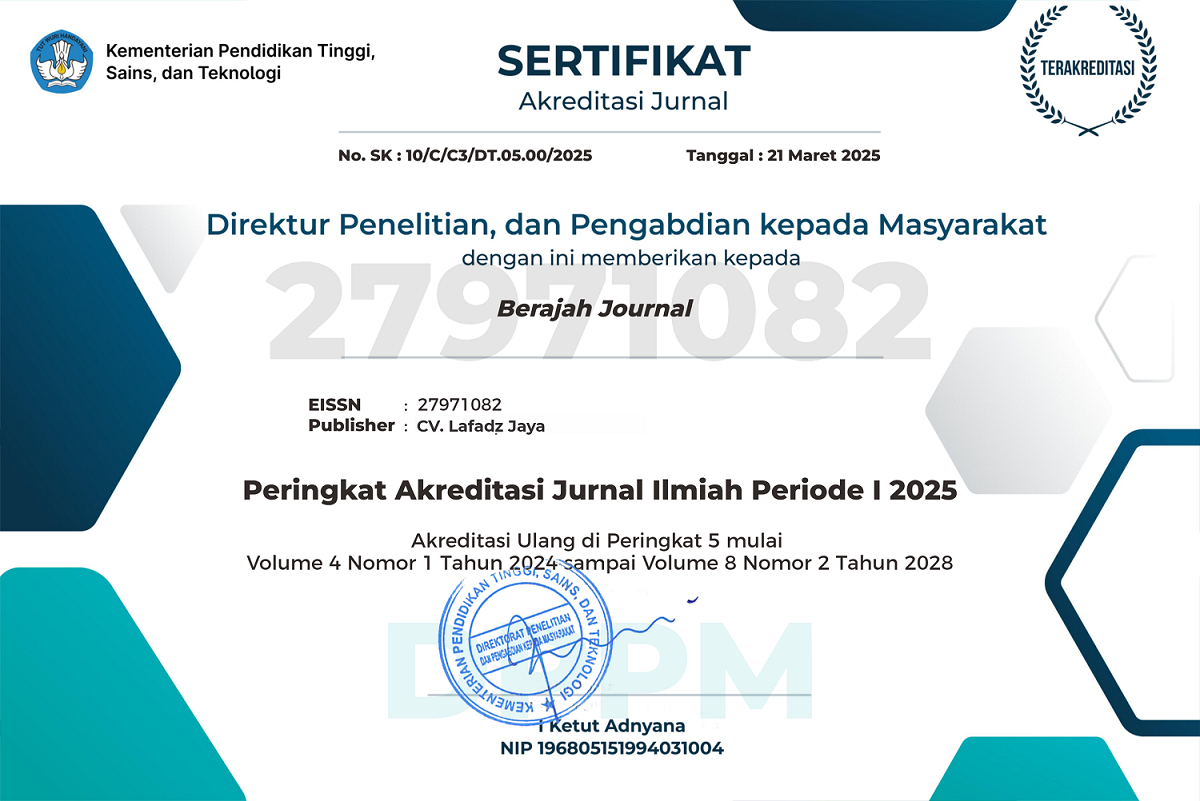PENGARUH WORKPLACE INCIVILITY DAN REGULASI EMOSI TERHADAP JOB STRESS PADA PERAWAT
DOI:
https://doi.org/10.47353/bj.v2i3.140Keywords:
job stress, regulasi emosi, workplace incivility, perawat, rumah sakitAbstract
Penelitian ini bertujuan untuk mengetahui pengaruh workplace incivility dan regulasi emosi terhadap job stress perawat. Stres di tempat kerja merupakan salah satu dampak kehidupan dalam organisasi dan setiap karyawan dalam pekerjaanya setidaknya pernah mengalami stres kerja karena tuntutan lingkungan pekerjaan. Terdapat berbagai tipe dan kuantitas stres kerja pada karyawan, diantaranya karyawan yang bekerja dibidang pelayanan kesehatan. Perawat yang bekerja di bidang pelayanan kesehatan memiliki tugas dan tanggung jawab yang tinggi, yang mana angka stres kerja perawat di Indonesia sebesar 50.9 %. Penelitian ini dilakukan pada 101 perawat, yang pernah mengalami incivility yang dilakukan oleh rekan kerja, data diperoleh dengan metode survei dan menggunakan instrumen IIBS Indonesian Incivility Behaviour Scale 28 aitem, General Work Stres Scale 9 aitem dan emotion regulation questionnaire 10 aitem. Hasil analisis menunjukkan bahwa Ha1 di terima terdapat pengaruh workplace incivility terhadap job stress perawat, dan Ha2 diterima bahwa terdapat pengaruh dimensi cognitive reappraissal terhadap job stress, Ha3 ditolak bahwa tidak ada pengaruh dimensi expressive supression terhadap job stress, dan Ha4 diterima bahwa terdapat pengaruh workplace incivility dan regulasi emosi terhadap job stress.
Downloads
References
Abdurrahman. (2017). Impelementasi Manajemen Kurikulum Pesantren Berbasis Pendidikan Karakter. At-Turas, 4(2) : 1-19.
Adaramola, S. S. (2012). Job Stress and Productivity Increase. Dept of Human Factors/Ergonomics.
Andersson, L. M., & Pearson, C. M. (1999). Tit for Tat? The Spiraling Effect of Incivility in the Workplace. The Academy of Management Review, 452-471.
Asifudin, A. J. (2016). Manajemen Pendidikan untuk Pondok Pesantren. Jurnal Manajemen Pendidikan Islam, 1(2) :355-367.
Bruin, G. P. (2005). The Dimensionality of the General Work Stress Scale: A hierarchical Exploratory Factor Analysis. SA Journal of Industrial Psychology.
Bruin, G. P., & Taylor, N. (2006). Development of the Sorces of Work Stress Inventory. PsySSA.
Budiwibowo, S., & Sudarmiani. (2018). Manajemen Pendidikan. Yogyakarta: Andi.
Demirtas, O., Ozdevecioglu, M., & Capar, N. (2015). The Relationship between Cognitive Emotion Regulation and Job Stress : Moderating Role of Social Support. Asian Social Science.
Ghozali, I. (2016). Aplikasi Ananlisis Multivariate dengan Program IBM SPSS. Surakarta: Muhammadiyah University.
Gozhali, I. (2009). Aplikasi Analisis Multivariate dengan Program SPSS. Semarang: Universitas Diponegoro.
Gross, J. J. (1998). The emerging field of emotion regulation: An integrative review. An integrative review. Review of General Psychology, 271–299.
Handoyo, S., Samian, Syarifah, D., & Suhariadi, F. (2018). The Measurement of Workplace Incivility in Indonesia: Evidence and Construct Validity. Psychology Research and Behavior Management, 217-226
Hasanah, D., Alfi, A., & Kurniasih, D. (2020). Kebijakan Pendidikan di Pondok Pesantren Al-Muayyad Surakarta Selama Masa Pandemi Covid19. Jurnal Pendidikan, 60-75.
Hu, S., & Dai, Q. (2021). Relationship between work stressors and mental health in frontline nurses exposed to COVID-19: A structural equation model analysis. Department of Nursing, the First Affiliated Hospital of Anhui Medical University.
Izard, C. E., Izard, C. E., Finlon, K. J., Krauthamer-Ewing, E. S., Grossman, S. R., & Seidenfeld, A. (2011). Emotion Knowledge, Emotion Utilization, and Emotion Regulation. Emotion Review, 44-52.
Kain, J., & Jex, S. (2010). job demands-control model: A summary of current issues and recommendations for future research. Emerald Group Publishing, 237–268.
Kasunic, M. (2005). Designing an Effective Survey. Ft. Belvoir Defense Technical Information Center SEP .
Khan, N. Z., Imran, A., & Nisar, Q. A. (2016). Emotional Exhaustion as Stressor ve-positive emotions that alters the outcomes of behavior concerning liveliness and emotional exhaustion. Under favorable circumstances it is taken on that there is stability between emotions of people (negative and positi. European Sciance, 908-920.
Khoshknab, M. F., Rasool, E. A., Elahi, N., Mohammad, E., & Khoshknab, M. F. (2017). How Do the Nurses Cope with Job Stress? A Study with Grounded Theory Approach. Journal of Caring Sciences, 199-211.
Lake, E. T., Smith, J. G., & Morin, K. H. (2017). Association of the Nurse Work Environment with Nurse Incivility in Hospitals. Wiley.
Lindsay, E. K., & Creswell, J. D. (2019). Mindfulness, acceptance, and emotion regulation: perspectives from Monitor and Acceptance Theory (MAT). Current Opinion in Psychology , 120-125.
Schilpzand, P., Parter, I. E., & Erez, A. (2016). Workplace incivility: A review of the literature and agenda for future research. Journal of Organizational Behavio, S57–S88.
Vagharseyyedin, S. A. (2015). Workplace incivility: a concept analysis. Contemporary Nurse.
Vivian, E., Oduor, H., Arceneaux, S. R., Flores, J. A., Vo, A., & Madden, B. M. (2019). A Cross-Sectional Study of Perceived Stress, Mindfulness, Emotional Self-Regulation, and Self-Care Habits in Registered Nurses at a Tertiary Care Medical Center. Open Nursing.
WHO. (2020, October 19). Occupational health: Stress at the workplace. Retrieved from https://www.who.int/news-room/q-a-detail/ccupational-health-stress-at-the-workplace
Downloads
Published
How to Cite
Issue
Section
License
Copyright (c) 2022 Novi Rahayu Febrianti, Dewi Syarifah, M.Psi, Psikolog

This work is licensed under a Creative Commons Attribution 4.0 International License.






















